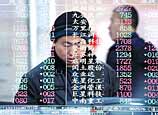
BEIJING, Feb. 18 (Xinhua) -- After Japan cranked up currency printing, the Japanese yen retreated to an almost 33-month low against the U.S. dollar on Monday, and the weakening currency could affect China's economy.
Japan instituted aggressive monetary quantitative easing (QE) policies early this year to stimulate its economy, but the policies have been driving down the value of the yen.
The currency has fallen 20 percent over the past four months as a result of Japan's bold inflationary move.
Although the Group of 20 nations declared last week in Moscow that there would be no currency war, a number of Asian currencies, including the Korean won and New Taiwan dollar, have devaluated alongside the weakening Japanese yen.
"Although the monetary policy situations in East Asia have not developed into a 'war,' a depreciation race has emerged in the region to a certain degree," said Liu Dongliang, a senior finance analyst with China Merchants Bank.
With concerns over how the QE could affect Japan's neighbors, Chinese Finance Minister Xie Xuren said at the G20 meeting that developed countries should reduce the negative impacts of the QE on other countries.
A weaker yen will put appreciation pressure on other currencies and lead to escalated trade frictions, said Zhang Ming, a senior economics researcher at the Chinese Academy of Social Sciences.
According to the calculations of Peng Wensheng, chief economist at China International Capital Corporation (CICC), a 20-percent depreciation of the Japanese yen against the Chinese yuan could lead to a 2.5-percentage point drop in China's exports.
However, Peng said China's export dependence on Japan has declined sharply, reducing the weakened yen's impact on China's foreign trade.
The CICC forecast that China's exports to Japan will likely see a slight drop of four percentage points, at most, in 2013, said Peng.
Still, China's auto and electronics exports to third parties will be challenged, as lower prices offered by Japanese rivals will be more competitive, according to Peng.
In addition to the impact on trade, Japan's QE will inject more liquidity into the global economy and increase the volatility of the world's capital market, said Zhang.
However, Japan's QE will affect the United States more than China, according to the CICC, as large amounts of Japanese capital are unlikely to flow into China over the short term.
China has barriers and restrictions on foreign capital, the company said, and Japanese capital accounts for just 7 percent of the total foreign direct investment (FDI) in China.
Moreover, Japan's QE could lead to global price hikes in energy and bulk commodities, as well as impose inflationary pressure on China, said Zhang.
The QE in the U.S., Europe and Japan will affect China's inflation this year, said Tang Jianwei, a senior analyst at the financial research center under Bank of Communications.
China's consumer price index (CPI) eased to 2 percent in January from a seven-month high in December, but the downward trend will be temporary.
The CICC said in a report that China's inflation will gain steam in February, with the growth rate accelerating to 2.7 percent to 2.9 percent.
















 A 9-year-old son takes good care of his amputee mother: "adults have a priority over delicious meals"
A 9-year-old son takes good care of his amputee mother: "adults have a priority over delicious meals"


![]()
